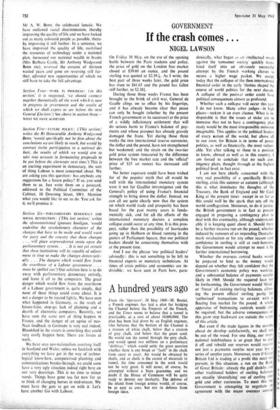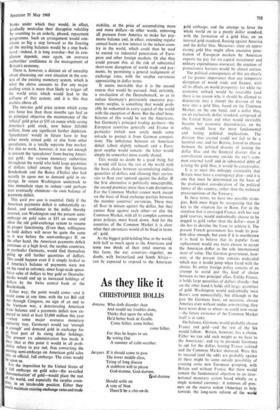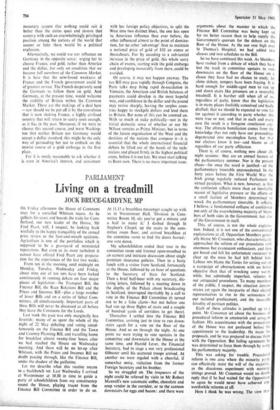If the crash comes . . .
GOVERNMENT NIGEL LAWSON
On Friday 10 May, on the eve of the opening battle between the Paris students and police, the price of gold on the London free market closed at $39.60 an ounce, and the pound sterling was quoted at $2.39;6. As I write, the best part of three weeks later, the gold price has risen to $41.65 and the pound has fallen still further, to $2.384-.
During those three weeks France has been brought to the brink of civil war, General de Gaulle clings on to office by his fingertips, and it has already become clear that peace can only be bought (whether by the present French government or its successor) at the price of a wildly inflationary settlement that will do serious harm to France's balance of pay- ments and whose prospect has already gravely damaged the franc. Yet during those three weeks the two international reserve currencies, the dollar and the pound, have not strengthened but weakened; and the strain on the two-tier gold price system (measured by the difference between the free market rate and the 'official' price of $35 an ounce) has increased still further.
No better exposure could have been wished for of the popular myth that all would be well with the international monetary system were it not for Gaullist intransigence and the General's policy of using France's financial strength to bring down the dollar. Instead, we can all see quite clearly now that the system on which world trade and prosperity haS been based for the past twenty years is funda- mentally sick, and for all the efforts of the international monetary doctors a complete collapse could occur at any time. It is this pros- pect, rather than the possibility of barricades going up in Holborn or blood running in the gutters of Parliament Square, that our political leaders should be concerning themselves with at the present time.
And I use the phrase 'our political leaders' advisedly: this is not something to be left to financial experts or monetary technicians. At times of crisis politics and economics are in- divisible: we have seen in Paris how, para- doxically, what began as an intellectual revolt against the 'consumer society' quickly trans- lated itself into an obviously successful attempt by the French working classes to secure a higher wage packet. We accept today that the collapse of the then international financial order in the early 'thirties shaped the course of world politics for the next decade. A collapse of the postwar order could have political consequences almost as profound.
Whether such a collapse will occur this year I do not know. Many sober judges—in high places—reckon it an even chance. What is in- disputable is that the issues at stake are so immense that not to have a contingency plan ready would be the most irresponsible omission imaginable. This applies to the political leaders of every nation of the world, but above all to our own; for Britain is in terms of power politics, as well as financially, the most vulner- able. Yet after talking to those in a position . to know, abroad as well as in this country, I am forced to conclude that no such con- tingency plans, thought through at the highest political level, in fact exist.
I am not here chiefly concerned with the very real possibility of a specifically British, sterling, crisis this summer or autumn (although this is what dominates the thoughts of the Treasury, the Bank of England and Mr Cecil King at the present time)---except in so far as this could well be the spark that sets off the world conflagration. Moreover, to dO it justice, the British government is in fact at present engaged in preparing . a contingency plan to deal with this eventuality, although understand- ably it is keeping quiet about it. Should there be a further massive run on the pound, whether induced by rumours of an impending Deutsche- mark revaluation or for any other reason (and confidence in sterling is still at rock-bottom), the Government would attempt to meet it by further international borrowing.
Whether the overseas central banks would be prepared to lend us the money would depend on whether they felt confident that the Government's economic policy was working, and a substantial balance of payments surplus likely in 1969. Should the required loan not be forthcoming, the Government would 'block' or 'freeze' all existing sterling balances, allow- ing the present official sterling parity for 'authorised' transactions to co-exist with a floating free market for the pound. A whole apparatus of buttressing controls would also be required; but the adverse consequences Of this giant step backward are outside the scene of this article.
But even if the trade figures in the months ahead do develop satisfactorily, we shall not be out of the wood: For one thing, our inter- national indebtedness is so great that to paY it off and rebuild our reserves would require not just a payments surplus next year but a series of surplus years. Moreover, even if Great Britain Ltd is trading at a profit this need not prevent, in this situation, a run on the Bank of Great Britain: already the gulf sheikhs and other traditional holders of sterling balances are steadily 'diversifying' out of sterling into gold and other currencies. To meet this the Government is attempting to negotiate as agreement with the major overseas central
banks under which they would, in effect, gradually neutralise their disruptive volatility by assenting to an orderly, phased, repayment programme. Such an arrangement would con- stitute as big a step forward as the freezing of the sterling balances would be a step back- ward—indeed, it is long overdue—but its con- clusion depends, once again, on overseas authorities' confidence in the management of Britain's economy.
There is, however, a distinct air of unreality about discussing our own situation in the con- text of the existing monetary system, which is what the above amounts to. For any major sterling crisis is more than likely to trigger off the world crisis which would lead to the collapse of that system; and it is this that matters above all.
The two-tier gold price system which came into force less than three months ago had as its principal objective the maintenance of the 'official' gold price at $35 an ounce while saving America's gold stock, now below $10,000 million, from any significant further depletion.
'Speculators' would in future have to buy either newly mined gold, or else from other speculators, in a totally separate free market.
For this to work, however,--it was not enough to prevent the 'speculators' from buying Ameri- can gold: the various monetary authorities throughout the world who hold large quantities of dollars (chief among them the German Bundesbank and the Banca d'Italia) also had secretly to agree not to demand gold in ex- change. In return Washington undertook to take immediate steps to reduce—and perhaps even eventually eliminate—its own balance of payments deficit.
This quid pro quo is essential. Only if the American payments deficit is substantially re-
duced, and confidence in the dollar thereby restored, can Washington end the present semi- embargo on gold sales at $35 an ounce and allow the old gold-exchange system to resume its proper functioning. (Even then, willingness to hold dollars will never be quite the same as it was before the semi-embargo.) If, on
the other hand, the American payments deficit continues at a high level, the surplus countries,
in particular Germany, would find themselves
piling up still further quantities of dollars. This could happen even if it simply looked as
if America's balance of payments were not on the road to solvency, since large-scale specu- lative sales of dollars to buy gold or Deutsche- marks would end up as increased holdings of dollars by the Swiss central bank or the Bundesbank.
Either way, the point would come—and it could come at any time, with the tax Bill still not through Congress, no sign of an end to the Vietnam war, a deteriorating American trade balance and a payments deficit now ex- pected to total at least $3,000 million this year —when some major overseas monetary authority (say, Germany) would say 'enough is enough' and demand gold in exchange for at least part of its rising dollar holdings. The present us administration has made it clear that at this point it would in all prob- ability refuse to pay out, thus converting the existing semi-embargo on American gold sales into an official, full embargo. The crisis would be upon us.
For the imposition by the United States of a full embargo on gold sales—the so-called 'demonetisation' of gold—would place the rest of the world, and especially the surplus coun- tries, in an intolerable position. Either they could maintain existing exchange rates and trade
stability, at the price of accumulating more and more dollars—in other words, removing all pressure from America to make her pay- ments balance and, in effect, extending regular annual loans at low interest to the richest coun- try in the world, which could then be used to extend us industrial penetration of Euro- pean and other foreign markets. Or else they could prevent this, at the risk of substantial short-term disruption of world trade and pay- ments, by permitting a general realignment of exchange rates, with the surplus currencies appreciating in dollar terms.
It seems inevitable that it is the second course that would be pursued. And, certainly, a revaluation of the Deutschemark, so as to reduce Germany's persistently excessive pay- ments surplus, is something that would prob- ably be welcomed in every capital of the world with the exception of Bonn. But the chief bene- ficiaries of this would be not the Americans, but Germany's principal trading partners—the European countries generally and France in particular (which now sorely needs some miracle to protect it from German competi- tion). The imbalance between an American deficit (albeit slightly reduced) and a Euro- pean surplus would remain: the latter would simply be somewhat more evenly shared.
This would no doubt be a good thing, but it would still leave the rest of the world with the basic choice between accumulating endless quantities of dollars and allowing their curren- cies to float ever upward against the dollar. If the first alternative is politically unacceptable, the second promises more than trade disruption. For the Common Market cannot work except on the basis of fixed exchange parities between the member countries' currencies. These may all float in unison against the dollar, but they cannot float against each other—or else the Common Market, with all its complex common price policies, must break down. And for the countries of the Common Market it is clear what their currencies would all be fixed in terms of : gold.
As the biggest gold-holding bloc in the world, with half as much again as the Americans and some two thirds of their total reserves in this form, the EEC countries—together, no doubt, with Switzerland and South Africa— can be expected to respond to the American
gold embargo, and the attempt to force the whole world on to a purely dollar standard, with the formation of a gold bloc, on an internal gold standard, floating against America and the dollar bloc. Moreover, since an appre- ciating gold bloc might allow excessive pene- tration of European markets by American exports (to pay for us capital investment and military expenditures overseas), the erection of protectionist barriers would be almost certain.
The political consequences of this are clearly of far greater importance than any temporary disruption of world trade and finance, with all its effects on world prosperity; for while the economic setback would be reversible (and there is no reason why it should be allowed to degenerate into a slump) the division of the west into a gold bloc, based on the Common Market, on the one hand, and a dollar bloc, on an exclusively dollar standard, composed of the United States and what would inevitably become her economic dependencies, on the other, would have the most fundamental and lasting political implications. The division thus created could not fail to be a harmful one; and for Britain, forced to choose between the political disaster of joining the dollar bloc and the financial disaster (for a convalescent economy outside the EEC'S com- mon external tariff and in substantial debt) of joining the gold bloc, it would be catastrophic.
It is to meet this unhappy eventuality that Britain must have a contingency plan—and it is one that must be determined on the basis of the profoundest consideration of the political future of this country, rather than the technical preoccupations of the Treasury.
In these terms, we have two possible strate- gies. Both must begin by recognising that the key to the situation lies in Bonn. For in the situation that is envisaged France, with her vast gold reserves, would undoubtedly choose to be pegged to gold rather than the dollar—even if she has to devalue the franc to achieve it. The present French government has made its posi- tion clear enough; but even if it is overthrown it is hard to believe that its popular front replacement would any more choose to accept the American dollar as the sole international store of value. The German government, how- ever, at the present time remains undecided which way it would jump when faced with the choice. Its entire foreign policy consists of an attempt to avoid just this kind of choice between its two principal allies. Unlike France, it holds large quantities of dollars already—but on the other hand it holds still large: quantities of gold. Washington would undoubtedly twist Bonn's arm unmercifully; but although in the past the Germans have, on occasion, chosen America even without undue arm-twisting, they have never done so when—as could now occur —the future existence of the Common Market itself is at stake.
On balance, Germany would probably choose France and gold—and the rest of the Six would follow. Britain, however, has a choice. Either we can add such weight as we have to the Americans', and try to persuade Germany to opt for the dollar, leaving France isolated and the Common Market shattered. Were this to succeed (and the odds are probably against it) there might be some outside possibility of creating some new European grouping, with Britain and without France. But there would remain the fundamental objection to an inter- national monetary system based wholly on a single national currency: it removes all pres- sure on the reserve nation (America) to help towards the long-term reform of the world
monetary system (for nothing could suit it better than the status quo) and invests that country with such an overwhelmingly privileged position among the nations of the world that sooner or later there would be a political explosion. Alternatively, we could use our influence on Germany in the opposite sense; urging her to choose France, and gold, rather than America and the dollar, but only on condition that we become full members of the Common Market. It is here that the new-found weakness of France and the French government could be of greatest service. The French desperately need the Germans to follow them on gold. And Germany, at the present time, would welcome the stability of Britain within the Common Market. There are the makings of a deal here —nor should we be put off it by the convulsion that is now shaking France, a highly civilised country that will return to sanity soon enough, as it has in the past. Moreover, if we were to choose this second course, and warn Washing- ton that neither Britain nor Germany would accept a dollar standard, this might be the only way of persuading her not to embark on the unwise course of a gold embargo in the first place.
For it is surely reasonable to ask whether it is even in America's interest, and consonant with her foreign policy objectives, to split the West into two distinct blocs, the one less open to American influence than ever before, the other influenced almost to the point of domina- tion, for no other 'advantage' than to maintain a notional price of gold of $35 an ounce or thereabouts. For by acceding to a substantial increase in the price of gold, this whole sorry chain of events, starting with the gold embargo and developing inexorably from there, could be avoided.
Of course, it may not happen anyway. The tax Bill may pass rapidly through Congress, the Paris talks may bring rapid de-escalation in Vietnam, the American and British balances of payments could develop in the most hopeful way, and confidence in the dollar and the pound may revive sharply, leaving the surplus coun- tries happy to stockpile dollars and lend them to Britain. But none of this can be counted on. With so much at stake politically—not in the trivial domestic sense of whether or not Mr Wilson remains as Prime Minister, but in terms of the future organisation of the West and the destinies of the nations that compose it—it is essential that the whole international financial debate be lifted out of the hands of the tech- nicians and placed firmly in the highest political arena, before it is too late. We must start talking to Bonn now. There is no more important issue.








































 Previous page
Previous page